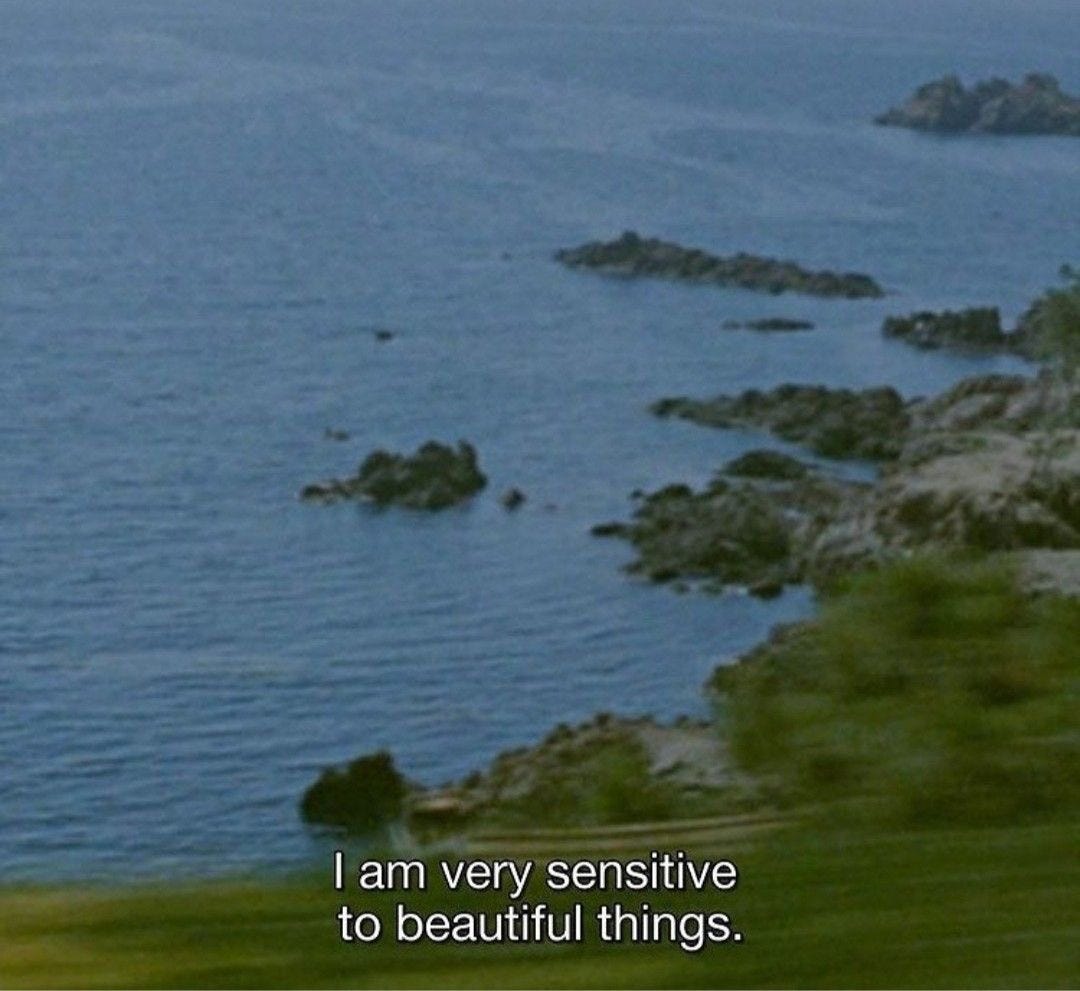A Lineated Essay on Waking Up After a Long Sleep
Xenia Gianiotis Turner on time, writing, and Caroline Polachek
Lately, I’ve been asking myself a lot of unanswerable questions. All of which begin
with the word why. Then, as if the interrogative was quicksand, it seems that I’m up to my neck in it; and with each compound question uttered goes more of the ground
on which I’m standing until I, too, am pulled asunder. Why did I climb a mountain
after dancing in brand new Chuck Taylors? Why haven’t I
blotted the blood from their bright white collars? Why, in spite of
all the beautiful scenery, does my attention seek out every stain? Over the edge
of falling apart, I am the backward spiral, obsessively seeking the origin of everything
from my little foxhole. The questions take from my lungs what little air is left, so let me steal
a little something from the muses. Avant-pop singer-songwriter Caroline Polachek
called it a “dilated-pupil feeling of being overwhelmed.”
Polachek was referring to the experimental ethos of Desire, I Want to Turn Into You,
her virtuosic 2023 album, while in conversation with electronic
musician OPN for Interview Magazine.1 The album was gearing up for its release,
and Polachek, conscious of the stakes, was buzzing with an energy of exhilarating uncertainty. “Chronically freaked out,” was another of Polachek’s disclosures describing her
mood leading up to release day, that moment when she’d have to hand
her proverbial baby over to the world and walk away. How else can a life begin?
For years, I didn’t much care about how. I imagine
a cyclical, slightly ruderous pattern of life will do that to you. Although, back then,
you wouldn’t have noticed any such pattern — you would be too consumed
by this existence to author anything beyond your own accidental survival. I call it an accident because the world goes dark when burrowed. God, how I would have died
to have had that 1960s California ennui, as crystalline as Didion’s prose. Alas,
I grew up wading in the Atlantic’s abstruse blues, adrift in the mire of my family’s Victorian duplex, swimming through channels of walled off residences teeming with Orthodox
Greeks subsisting on Byzantine icons and Great Lent. But why does any of that matter
now? Why not just get to the point!
Well, I guess I understand Polachek’s predicament — at least to the degree that I can’t
live without turning my emotional experiences into objects
to give to the world — and I empathize with Polachek’s anxious preoccupation with letting go.
I used to transcribe my feelings and distill my desires
into pop songs, and performing them in front of intimate audiences, each show
became the setting for an embodied release of full-on emotion. Not a meter of logic to it, save for the involuntary mechanism forever keeping time, and for years, this kept
me coasting on an even keel. At my most flagellatory, I believed
it was the attention I sought from baring my soul on stage. But now, as I err
into forgiveness, I think it was really about the sincerity of the act — and the audience
who bore witness — the venerators of my vulnerability. It worked like a drug. Then,
like a drug, the limelight lost its luster and everything about me dimmed. Why must you always go dark?
I guess it’s where I’ve made my home, like the one I came from, you can’t always choose
these things. And, sure, it’s time to admit that I like it, too,
the darkness, and I’m hardly alone in that respect. I used to point fingers
into the past, at my dead-beat dad and his narcissism, or my tortured mom, forever a fatalist. I recall an entire chorus of maligned voices to choose from. Why does it make you happy, then?
Once time starts to trickle away from your days and nights without
notice, you’re just another protoplasm oozing toward obsolescence — no different
from the central processing unit kissing your cheekbone or the child
bouncing on your mother’s knee. Who said anything about happiness?
Excuse me, I ask the questions here.
No, you don’t.
Yes, I do.
No, you don’t.
Yes, I do.
So, is this why we write!? As if
a sudden switch in syntax, a grammatical play to make semantics fit
an expert’s pointed view, would produce a satisfactory response
to our amoebic conundrum. Savvy nonetheless, shape-shifting won’t save us, proud as we are
of all our intellect — in/capable as it is of reducing the beguiling underbelly of
experience into a prickly dichotomy! Good riddance!
Our conviction demands that we multiply the possibilities, swell the nervous system, intensify the dastardly thought experiment to its boiling point!
And yet, it is hardly enough,
for it is why I am wanting after, not what or when — and how has always been there — dozing
in and out of consciousness for decades. Why, you ask?
Because
how’s hibernating — waiting on you
to find the words.
Xenia Gianiotis Turner is a writer, musician, and existentialist. Torn between awe and dread, she writes impressionistic and visceral pieces that probe at herself and the paradoxical across genre. Xenia earned her MFA in creative writing from Manhattanville University in 2024, and has creative nonfiction forthcoming in Inkwell. She resides in New York.




